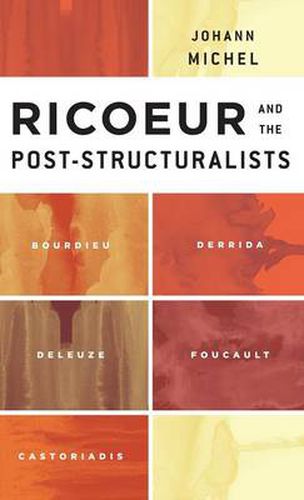Readings Newsletter
Become a Readings Member to make your shopping experience even easier.
Sign in or sign up for free!
You’re not far away from qualifying for FREE standard shipping within Australia
You’ve qualified for FREE standard shipping within Australia
The cart is loading…






In this important and original book, Johann Michel paves the way for a greater understanding of Paul Ricoeur’s philosophy by exploring it in relation to some major figures of contemporary French thought-Bourdieu, Derrida, Deleuze, Foucault and Castoriadis.
Although the fertile dialogue between Ricoeur and various structuralist thinkers is well documented, his position in relation to the post-structuralist movement is less-widely understood. Does Ricoeur’s philosophy stand in opposition to post-structuralism in France or, on the contrary, is it in fact a unique variation of that movement? This book defends the latter statement. Michel speaks of post-structuralisms in the plural form and engages them in a dynamic confrontation between Ricoeur and his contemporaries in the French intellectual scene. The result is a better understanding of Ricoeur’s thought and also of the distinctive issues that emerge through confrontation between Ricoeur and each of these post-structuralist thinkers.
$9.00 standard shipping within Australia
FREE standard shipping within Australia for orders over $100.00
Express & International shipping calculated at checkout
In this important and original book, Johann Michel paves the way for a greater understanding of Paul Ricoeur’s philosophy by exploring it in relation to some major figures of contemporary French thought-Bourdieu, Derrida, Deleuze, Foucault and Castoriadis.
Although the fertile dialogue between Ricoeur and various structuralist thinkers is well documented, his position in relation to the post-structuralist movement is less-widely understood. Does Ricoeur’s philosophy stand in opposition to post-structuralism in France or, on the contrary, is it in fact a unique variation of that movement? This book defends the latter statement. Michel speaks of post-structuralisms in the plural form and engages them in a dynamic confrontation between Ricoeur and his contemporaries in the French intellectual scene. The result is a better understanding of Ricoeur’s thought and also of the distinctive issues that emerge through confrontation between Ricoeur and each of these post-structuralist thinkers.